条件状语从句98771
- 格式:doc
- 大小:22.50 KB
- 文档页数:3
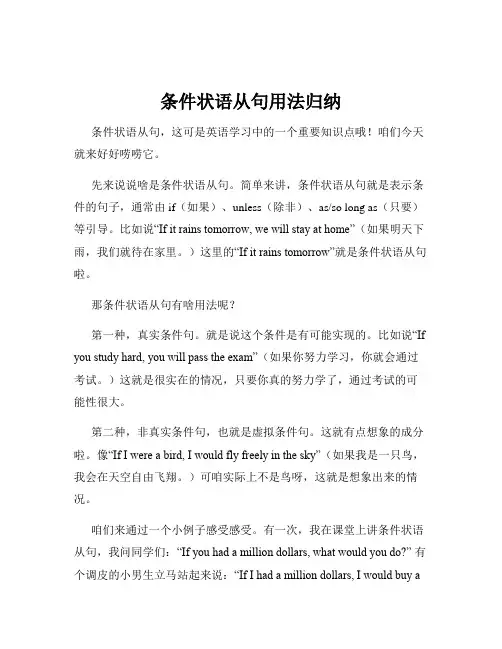
条件状语从句用法归纳条件状语从句,这可是英语学习中的一个重要知识点哦!咱们今天就来好好唠唠它。
先来说说啥是条件状语从句。
简单来讲,条件状语从句就是表示条件的句子,通常由 if(如果)、unless(除非)、as/so long as(只要)等引导。
比如说“If it rains tomorrow, we will stay at home”(如果明天下雨,我们就待在家里。
)这里的“If it rains tomorrow”就是条件状语从句啦。
那条件状语从句有啥用法呢?第一种,真实条件句。
就是说这个条件是有可能实现的。
比如说“If you study hard, you will pass the exam”(如果你努力学习,你就会通过考试。
)这就是很实在的情况,只要你真的努力学了,通过考试的可能性很大。
第二种,非真实条件句,也就是虚拟条件句。
这就有点想象的成分啦。
像“If I were a bird, I would fly freely in the sky”(如果我是一只鸟,我会在天空自由飞翔。
)可咱实际上不是鸟呀,这就是想象出来的情况。
咱们来通过一个小例子感受感受。
有一次,我在课堂上讲条件状语从句,我问同学们:“If you had a million dollars, what would you do?” 有个调皮的小男生立马站起来说:“If I had a million dollars, I would buy abig house and a super cool car for my teacher!” 全班哄堂大笑,我也忍不住笑了。
这孩子,还挺会哄老师开心呢!接下来说说条件状语从句的时态问题。
在真实条件句中,如果主句是一般将来时,从句要用一般现在时。
就像“If you come here tomorrow, I will be very happy” 而在虚拟条件句中,时态就有很多变化啦,这可得好好记住。
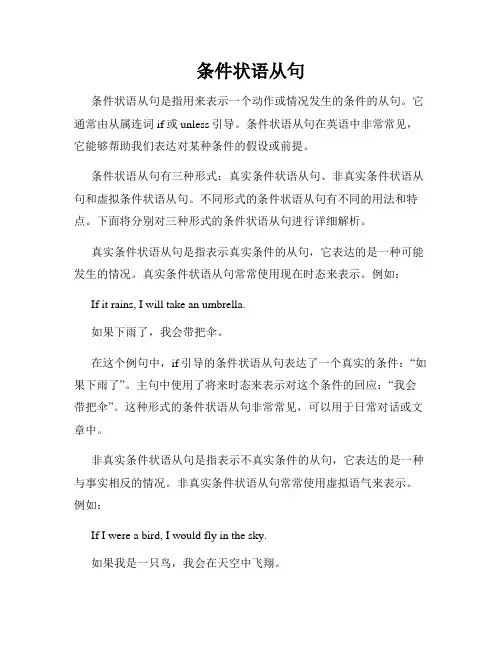
条件状语从句条件状语从句是指用来表示一个动作或情况发生的条件的从句。
它通常由从属连词if或unless引导。
条件状语从句在英语中非常常见,它能够帮助我们表达对某种条件的假设或前提。
条件状语从句有三种形式:真实条件状语从句、非真实条件状语从句和虚拟条件状语从句。
不同形式的条件状语从句有不同的用法和特点。
下面将分别对三种形式的条件状语从句进行详细解析。
真实条件状语从句是指表示真实条件的从句,它表达的是一种可能发生的情况。
真实条件状语从句常常使用现在时态来表示。
例如:If it rains, I will take an umbrella.如果下雨了,我会带把伞。
在这个例句中,if引导的条件状语从句表达了一个真实的条件:“如果下雨了”。
主句中使用了将来时态来表示对这个条件的回应:“我会带把伞”。
这种形式的条件状语从句非常常见,可以用于日常对话或文章中。
非真实条件状语从句是指表示不真实条件的从句,它表达的是一种与事实相反的情况。
非真实条件状语从句常常使用虚拟语气来表示。
例如:If I were a bird, I would fly in the sky.如果我是一只鸟,我会在天空中飞翔。
在这个例句中,if引导的条件状语从句表达了一个不真实的条件:“如果我是一只鸟”。
主句中使用了虚拟语气来表达对这个条件的回应:“我会在天空中飞翔”。
非真实条件状语从句常用来表示对于当前事实的设想或假设。
虚拟条件状语从句是指表示与过去事实相反的条件的从句,它同样使用虚拟语气来表示。
例如:If I had known the truth, I would have told you.如果我当时知道真相,我会告诉你的。
在这个例句中,if引导的条件状语从句表达了一个与过去事实相反的条件:“如果我当时知道真相”。
主句中使用了虚拟语气来表达对这个条件的回应:“我会告诉你”。
这种形式的条件状语从句常用来表达对过去事实的假设或反悔。
条件状语从句在英语中非常常见,掌握好它们的用法能够帮助我们更准确地表达自己的意思。
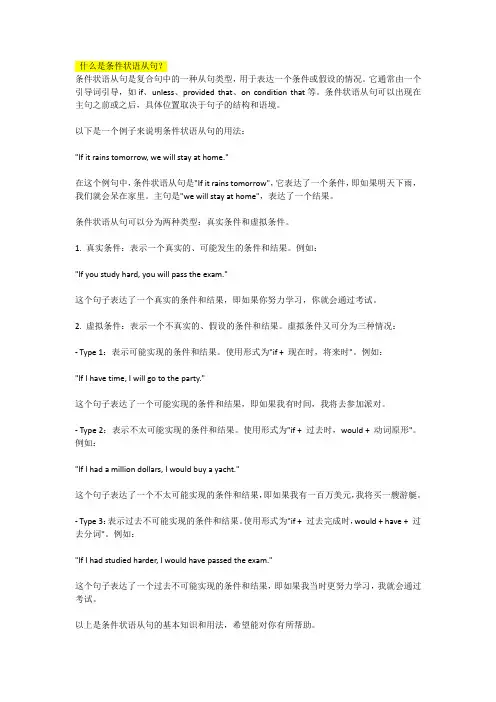
什么是条件状语从句?条件状语从句是复合句中的一种从句类型,用于表达一个条件或假设的情况。
它通常由一个引导词引导,如if、unless、provided that、on condition that等。
条件状语从句可以出现在主句之前或之后,具体位置取决于句子的结构和语境。
以下是一个例子来说明条件状语从句的用法:"If it rains tomorrow, we will stay at home."在这个例句中,条件状语从句是"If it rains tomorrow",它表达了一个条件,即如果明天下雨,我们就会呆在家里。
主句是"we will stay at home",表达了一个结果。
条件状语从句可以分为两种类型:真实条件和虚拟条件。
1. 真实条件:表示一个真实的、可能发生的条件和结果。
例如:"If you study hard, you will pass the exam."这个句子表达了一个真实的条件和结果,即如果你努力学习,你就会通过考试。
2. 虚拟条件:表示一个不真实的、假设的条件和结果。
虚拟条件又可分为三种情况:- Type 1:表示可能实现的条件和结果。
使用形式为"if + 现在时,将来时"。
例如:"If I have time, I will go to the party."这个句子表达了一个可能实现的条件和结果,即如果我有时间,我将去参加派对。
- Type 2:表示不太可能实现的条件和结果。
使用形式为"if + 过去时,would + 动词原形"。
例如:"If I had a million dollars, I would buy a yacht."这个句子表达了一个不太可能实现的条件和结果,即如果我有一百万美元,我将买一艘游艇。
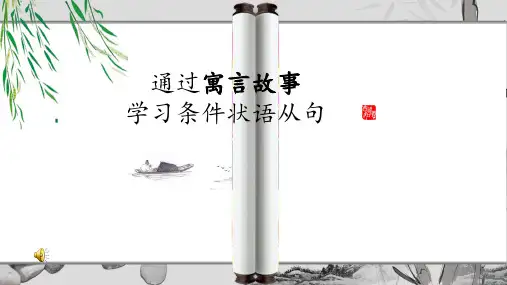
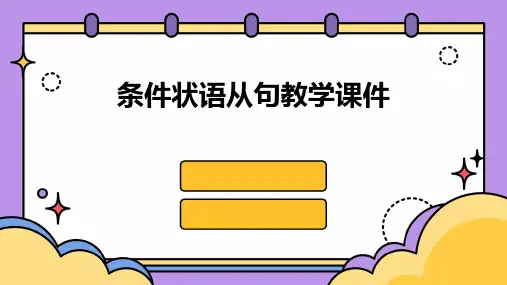
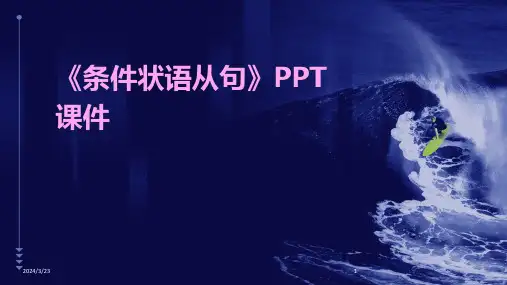
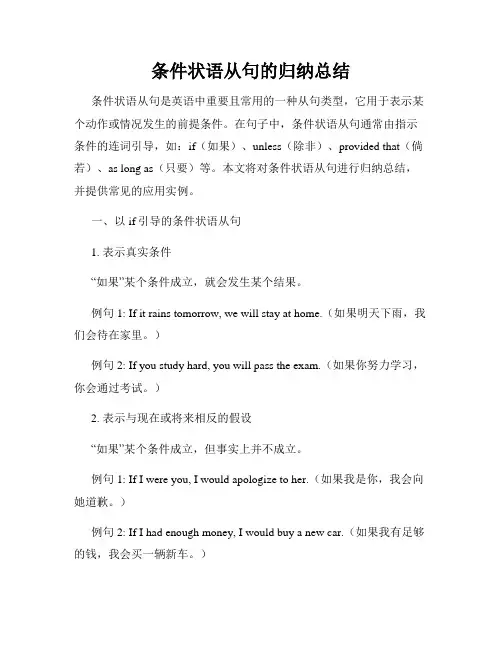
条件状语从句的归纳总结条件状语从句是英语中重要且常用的一种从句类型,它用于表示某个动作或情况发生的前提条件。
在句子中,条件状语从句通常由指示条件的连词引导,如:if(如果)、unless(除非)、provided that(倘若)、as long as(只要)等。
本文将对条件状语从句进行归纳总结,并提供常见的应用实例。
一、以if引导的条件状语从句1. 表示真实条件“如果”某个条件成立,就会发生某个结果。
例句1: If it rains tomorrow, we will stay at home.(如果明天下雨,我们会待在家里。
)例句2: If you study hard, you will pass the exam.(如果你努力学习,你会通过考试。
)2. 表示与现在或将来相反的假设“如果”某个条件成立,但事实上并不成立。
例句1: If I were you, I would apologize to her.(如果我是你,我会向她道歉。
)例句2: If I had enough money, I would buy a new car.(如果我有足够的钱,我会买一辆新车。
)3. 表示过去某个假设的结果“如果”过去某个条件成立,就会有相应的结果。
例句: If he had studied harder, he would have passed the exam.(如果他当时学得更努力,他就会通过考试。
)二、以unless引导的条件状语从句unless的意思是“除非”,用于表示某个条件不成立时才会发生某个结果。
例句1: We won't go shopping unless it stops raining.(除非停止下雨,否则我们不会去购物。
)例句2: You won't lose weight unless you exercise regularly.(除非你定期锻炼,否则你无法减肥。
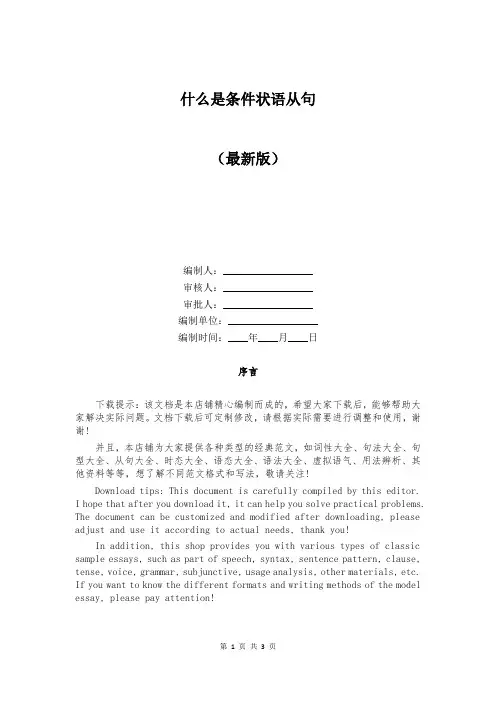
什么是条件状语从句(最新版)编制人:__________________审核人:__________________审批人:__________________编制单位:__________________编制时间:____年____月____日序言下载提示:该文档是本店铺精心编制而成的,希望大家下载后,能够帮助大家解决实际问题。
文档下载后可定制修改,请根据实际需要进行调整和使用,谢谢!并且,本店铺为大家提供各种类型的经典范文,如词性大全、句法大全、句型大全、从句大全、时态大全、语态大全、语法大全、虚拟语气、用法辨析、其他资料等等,想了解不同范文格式和写法,敬请关注!Download tips: This document is carefully compiled by this editor.I hope that after you download it, it can help you solve practical problems. The document can be customized and modified after downloading, please adjust and use it according to actual needs, thank you!In addition, this shop provides you with various types of classic sample essays, such as part of speech, syntax, sentence pattern, clause, tense, voice, grammar, subjunctive, usage analysis, other materials, etc. If you want to know the different formats and writing methods of the model essay, please pay attention!什么是条件状语从句引导条件状语从句的从属连词主要的有if, unless, as [so] long as等:You can leave now if you like. 如果你愿意现在就可以走了。
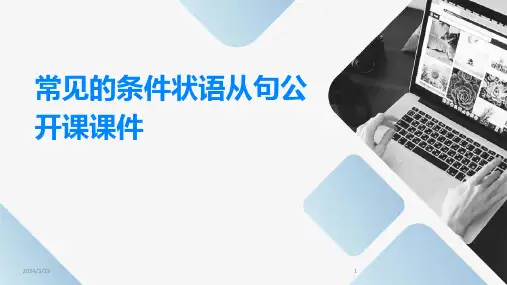

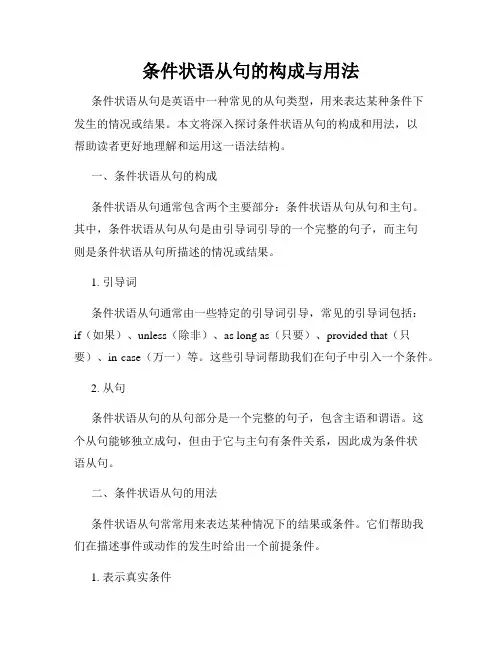
条件状语从句的构成与用法条件状语从句是英语中一种常见的从句类型,用来表达某种条件下发生的情况或结果。
本文将深入探讨条件状语从句的构成和用法,以帮助读者更好地理解和运用这一语法结构。
一、条件状语从句的构成条件状语从句通常包含两个主要部分:条件状语从句从句和主句。
其中,条件状语从句从句是由引导词引导的一个完整的句子,而主句则是条件状语从句所描述的情况或结果。
1. 引导词条件状语从句通常由一些特定的引导词引导,常见的引导词包括:if(如果)、unless(除非)、as long as(只要)、provided that(只要)、in case(万一)等。
这些引导词帮助我们在句子中引入一个条件。
2. 从句条件状语从句的从句部分是一个完整的句子,包含主语和谓语。
这个从句能够独立成句,但由于它与主句有条件关系,因此成为条件状语从句。
二、条件状语从句的用法条件状语从句常常用来表达某种情况下的结果或条件。
它们帮助我们在描述事件或动作的发生时给出一个前提条件。
1. 表示真实条件当条件状语从句描述的条件是真实的,与主句的结果一致时,我们可以使用条件状语从句来说明这种关系。
例如:If it rains, we will stay at home.(如果下雨,我们会呆在家里。
)2. 表示假设、虚拟条件有时候,条件状语从句描述的条件与主句的结果并不一致,这时我们可以使用条件状语从句来表示假设或虚拟条件。
例如:If I were you, I would take the job.(如果我是你的话,我会接受这个工作。
)3. 表示必然、可能性条件条件状语从句还可以用来表示某种条件下的必然或可能性。
例如:As long as you study hard, you will succeed.(只要你努力学习,你就会成功。
)Provided that you finish the project on time, you can take a vacation.(只要你按时完成项目,你可以休假。
条件状语从句英语语法要点什么是条件状语从句?条件状语从句是英语中一种常见的从句类型,它用于表达一个条件和所产生的结果之间的关系。
条件状语从句通常由一个条件状语从句引导词引导,如“if”、“unless”、“providing (that)”等。
条件状语从句引导词引导,如“if”、“unless”、“providing (that)”等。
条件状语从句的构成条件状语从句由一个主句和一个从句构成,从句用来表达条件,而主句则表达结果。
条件状语从句引导词以下是一些常见的条件状语从句引导词:- “if”: 当条件从句中的条件为真时,主句发生。
- “unless”: 如果不满足条件从句中的条件,主句发生。
- “providing (that)”: 当条件从句中的条件为真时,主句发生。
- “as long as”: 只要条件从句中的条件为真,主句发生。
- “in case”: 以防条件从句中的条件发生,主句发生。
条件状语从句的语序条件状语从句通常采用陈述语序,即主语+谓语动词+其他成分。
陈述语序,即主语+谓语动词+其他成分。
例如:- If it rains tomorrow, we will stay at home.- Unless you study hard, you will fail the exam.是否使用逗号在条件状语从句中,通常只有在从句位于主句之前时才使用逗号。
例如:- If you have any questions, please let me know.- I will go to the party if I finish my work on time.省略条件状语从句的主语和谓语在条件状语从句中,当主句和从句的主语和谓语相同时,可以省略条件从句中的主语和谓语。
例如:- If you can, I can too.特殊情况:倒装句在某些情况下,条件状语从句的主句可以采用倒装语序。
初中英语知识点归纳条件状语从句的引导词和构成条件状语从句是英语中常用的一种复合句结构,用于表达某种条件下的结果或后果。
它由引导词引导,构成的规律也比较固定。
下面将对初中英语知识点中条件状语从句的引导词和构成进行归纳总结。
一、条件状语从句的引导词在条件状语从句中,常见的引导词有:if(如果)、unless(除非)、as long as(只要)、provided that(只要)、in case(以防)、on condition that(在...条件下)等。
1. if(如果)if引导的条件状语从句用来表达一种假设情况,后面的结果或后果是可能发生的。
例如:- If it rains tomorrow, we will stay at home.(如果明天下雨,我们将呆在家里。
)- You will succeed if you work hard.(如果你努力工作,你会成功。
)2. unless(除非)unless引导的条件状语从句表达某种可能性的否定情况,相当于if not。
例如:- Unless you study harder, you won't pass the exam.(除非你更努力学习,否则你无法通过考试。
)- I won't go to the party unless you invite me.(除非你邀请我,否则我不会去参加派对。
)3. as long as(只要)as long as引导的条件状语从句表示某种条件成立时,将会有一定的结果或后果。
例如:- You can go out and play as long as you finish your homework.(只要你完成作业,就可以出去玩。
)- As long as you try your best, you will succeed.(只要你尽力,你会成功的。
)4. provided that(只要)provided that引导的条件状语从句表示在某一条件下,才会出现某种结果或后果。
什么是条件状语从句?条件状语从句(Adverbial Clauses of Condition)是一种从属从句,用于描述一个事件或行为的条件。
条件状语从句通常由条件连词引导,例如if(如果)、unless(除非)、provided that (只要)、in case(万一)等。
条件状语从句用于表达一个条件,指示事件发生的前提或限制。
以下是一些条件状语从句的例子:- If it rains, we will stay indoors.(如果下雨,我们会呆在室内。
)- He won't pass the exam unless he studies hard.(除非他努力学习,否则他不会通过考试。
)- Provided that you finish your work, you can go out and play.(只要你完成了工作,你就可以出去玩。
)- Take an umbrella with you in case it rains.(带把雨伞以防下雨。
)条件状语从句用于描述事件发生的条件或限制,帮助我们更准确地表达事件发生的前提条件。
它们可以用于各种语境,如日常交流、写作、演讲等。
需要注意的是,条件状语从句在语法结构和使用规则上可能有所差异。
例如,if通常用于表示真实条件,而unless表示否定条件,provided that表示假设条件,in case表示预防性条件。
因此,在使用条件状语从句时,应注意选择合适的条件连词并遵循相应的语法规则。
总之,条件状语从句是一种用于描述事件发生条件或限制的从属从句。
它们通过条件连词引导,提供了关于事件发生条件的更多信息。
理解和正确使用条件状语从句对于准确表达和理解事件发生的条件是非常重要的。
条件状语从句的用法及规则
一、什么是条件状语从句
条件状语从句是一种由两个句子组成的句子,其中一个句子是主句,另一个句子是从句,主句里提出一种条件,如果这种条件符合真实情况,从句中所描述的结果就会发生,否则不会发生,也称为“如果…就…”句型。
1、真实条件句:表示对真实的事件的假设,如果条件成立,其结果就会出现,如“如果天气好,我们就去野餐。
”
1、条件句时态
一般情况下,主句用一般现在时,从句要使用一般将来时,如“如果你有时间,就来帮我吧。
”
2、从句动词形式
从句动词通常要使用虚拟语气的动词形式,即should、would、could、might、may 等动词,如“如果你有机会,就去旅游吧。
”
3、从句连词
条件状语从句中用if或unless开头,如果表示假设的从句中的时间和条件相反,就用unless开头,如“Unless it rains,we'll go for a picnic.”
4、从句祈使句
条件状语从句中如果情态动词后是祈使句,则祈使句要用虚拟语气,如“If you have time,come and help me.”
5、从句否定句
如果从句为否定句,只有not带有情态动词,其余从句里的动词可以使用基本形式,如“If you do not go there,you will regret it.”
四、总结
条件状语从句是一种由两个句子组成的句子。
它描述的是在一定条件成立的情况下会发生的一种结果。
其中,主句中用一般现在时,从句中用一般将来时的虚拟语气。
一般用if或unless开头,如果从句为否定句,只有not带有情态动词,其余从句里的动词可以使用基本形式。
什么是条件状语从句?条件状语从句(Conditional Adverbial Clauses)是英语中一种用来表示条件的从句结构,它用于描述一个事件发生的条件、假设或可能性。
条件状语从句通常由一个引导词引导,用于连接主句和从句,并在主句中充当状语的作用。
以下是关于条件状语从句的详细解释和使用指导:条件状语从句的引导词:条件状语从句通常由一些引导词引导,常见的引导词有:if、unless、provided (that)、as long as、in case、suppose、on condition that等。
这些引导词用来引导条件状语从句,并表示主句和从句之间的条件关系。
例如:- If it rains tomorrow, we will stay at home.(如果明天下雨,我们会呆在家里。
)- Unless you study hard, you will not pass the exam.(除非你努力学习,否则你不会通过考试。
)- You can use my car as long as you drive carefully.(只要你开车小心,你可以使用我的车。
)条件状语从句的位置和结构:条件状语从句通常位于主句之前或主句之后,用于描述事件发生的条件、假设或可能性。
条件状语从句可以使用陈述语气或虚拟语气。
以下是两种常见的条件状语从句结构:1. 陈述语气条件状语从句:陈述语气条件状语从句用于描述真实的条件和假设,通常使用现在时态或过去时态。
例如:- If it rains, we will stay at home.(如果下雨,我们会呆在家里。
)- If I see him, I will tell him the news.(如果我见到他,我会告诉他这个消息。
)2. 虚拟语气条件状语从句:虚拟语气条件状语从句用于描述非真实的条件和假设,通常使用虚拟语气的形式。
常见的形式包括一般现在时虚拟、过去时虚拟和过去完成时虚拟等。
在句子中做条件状语的从句称为条件状语从句。
可置于句首、句尾,有时还可置于主语和谓语之间。
引导条件状语从句的连接词有:if ,unless,as/so long as等
1.if引导的条件状语从句
表示在某种条件下某事很可能发生。
If we pay much attention to the earth, we'll have a better world.
如果我们多关爱地球,就会拥有一个更美好的世界
If it rains tomorrow, what shall we do?
如果明天下雨,我们怎么办?
注意:if还可以引导虚拟条件句,表示不可实现的条件,从句中多用一般过去时或过去完成时。
What would happen if there were no water ?
如果没有水会怎样?
2.unless引导的条件状语从句
unless的意思是如果不,除非。
可与if...not互换。
You will fail in English unless you work hard.
你英语考试会不及格的,除非你更加努力。
3.as /so long as引导的条件状语从句
as /so long as意思是“只要”
So long as you're happy,i will be happy.
只要你高兴,我就高兴。
4.once引导的条件状语从句
once引导的条件状语从句,意为“一旦...,就”,从句可置于主句前或后
Once you begin,never stop.
一旦开始,就绝不要停止
Maths is easy to learn once you understand the rules.
一旦你理解了规则,数学就不难学了。
提示:在条件状语从句中,用一般现在时代替一般将来时,用一般过去时代替过去将来时。
If the weather is bad next week, we'll put off the climbing.
如果下周天气不好,我们将推迟爬山。
Father told me if i worked hard he would buy me a gift.
爸爸告诉我,如果我努力学习,他会给我买一份礼物。
If the weather is bad next week, we'll put off the climbing.
I.选择最佳答案.
( ) 1.If it ______ sunny tomorrow, I ____ boating.
a. is go
b. will be, go
c. is, will go
d. will be, will go
( ) 2.----what will you do if it ______ tomorrow,
----I’ll stay at home and watch TV. a. rain b. rains c. will rain d. is raining
3 Run fast, or you’ll be late for school.
_______ you _______ _______ fast, you’ll be late for school.
4. You can buy the dictionary if you take enough money with you.
Take enough money with you, ______ _____ ______ buy the dictionary.
5 If there is no air, none of us can live.
None of us can live _______ _________.
6. 如果明天有空,我和你一起参观长城。
_______________________________________________
7 如果我们骑自行车去上班,我们可以避免空气污染。
______________________________________________
8 如果明天他不来,我会代替他去的。
_______________________________________________
9. I don't know wheather he _______( come) tomorrow.
If he______( come), I'll tell you.
10 We will go to the park unless it _______ ( rain )
11If he ___in half an hour,we ___wait for him.
A.won't come ,won't
B.won't come ,don't
C.doesn't come ,won't
D.will come ,don't
12如果他考试不及格,他的母亲会难过的.
His mother____ ____ ____ if he ____ pass the exam.
13如果他明天起床不够早的话,就不能赶上早班车
If he ___ get up early ___,he ___ be able to catch the early bus.
141.If you _____ to the party, you’ll have a great time.
A. will go
B. went
C. go
D. going
15. It will be a long time ____ Peter _____ his work.
A. since, has finished
B. after, finishes
C. when, will finish
D. before, finishes.
16 What will father _____ us from Japan?A. take B. bring C. carry D. make
17. Weifang is famous ______ kites. A. for B. to C. on D. with
18. I ____ her the answer if she ____me.
A. can tell, will ask
B. will tell, will ask
C.would tell, ask
D. will tell, asks
19 – What are you going to do tomorrow?
--We’ll go to the library tomorrow if it ____.
A. isn’t rain
B. rain
C. won’t rain
D. doesn’t rain
20.—Do you know when he will come back tomorrow?
--Sorry, I don’t know. When he ____ back, I’ll tell you.
A. comes
B. will come
C. come
D. may come
21. What will you do if you _____ to the old folk’s home visit?
A. go
B. went
C.going
D. will go
22. If I eat ____ food, I’ll be very fat.
A. too many
B. many too
C. too much
D. much too
23. I’ll give the book to him if he ___ h ere next Sunday.
A. will come
B. comes
C. is coming
D. came
24. There ____an English film in our school tomorrow.
A. is going to have
B. will have
C. is going to be
D. has
24. Could you tell us where ____?
A. will the next Olympic Games held
B. the next Olympic Games will be held
C. would the next Olympic Games be held
D. the next Olympic Games would be held
25. When my mother returned last night, I ____ a book.
A. read
B. am reading
C. was reading
D. am going to read
26.What ____ you ____ when it began to rain?
A. do, do
B. were, doing
C. are, doing
D. did, do
27. I’ll wake you up when he ____back.
A. will
B. is going to come
C. comes
D. come
如有侵权请联系告知删除,感谢你们的配合!。